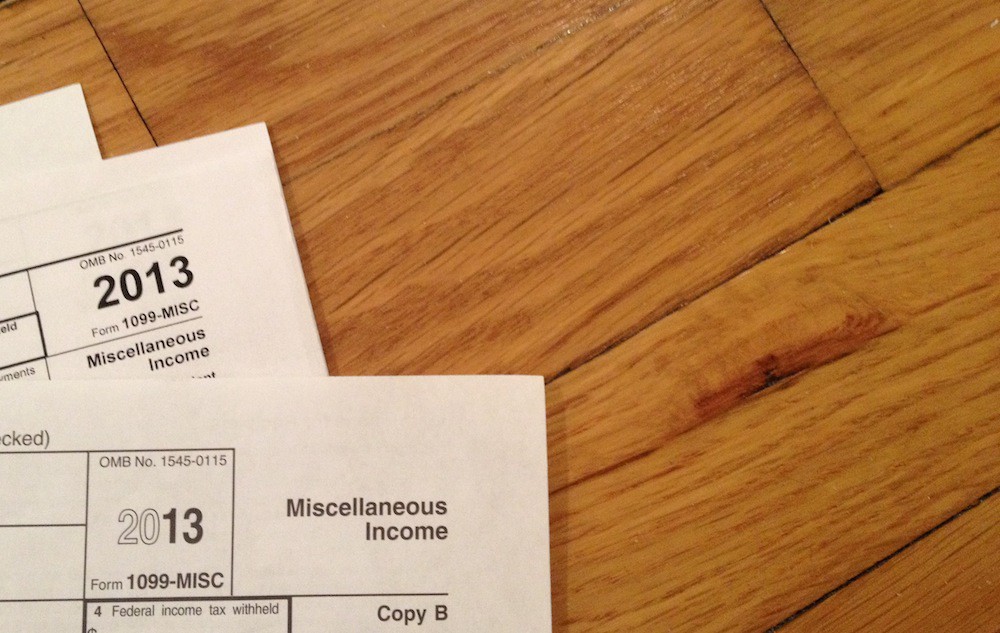Ask a CPA: My Client is Dodging Questions About Taxes, Help!
by A CPA

Dear a CPA,
I am a freelance writer and one of my regular clients will not answer my questions about taxes. He pays me in checks, and while it seems on the up-and-up, I know I’m making enough from his company to report it (I made around $2,000 from him in 2014 and expect to make around $7,000 this year). With someone else, I might simply stop working for them, but we’ve known each other for years. I like him as a person, and respect him in many ways. I don’t want to offend him and I also don’t want to lose him as a client.
I’m also completely baffled why, as an employer, he wouldn’t have a system in place for this. I have asked him multiple times how he handles taxes, and he always changes the subject or “forgets” to reply to those emails. He’s charming and great at being evasive.
So, what do you think is going on here? If he’s going to be paying me that much, wouldn’t it be in his best interest to report it? Obviously, I don’t want to give part of my freelance income to the government, but I don’t want to get audited (and I’m the kind of person who does their taxes because authority! and it would be wrong not to [see:Catholic guilt]).
I guess my question has a few parts: What will happen to me if I don’t figure this out and report all my income properly? Why would an employer choose to pay this much “under the table” as they say? How can I bring this up in a way that gets my point across, but isn’t terribly awkward? If I suspect him of cheating on his taxes, is it like, unethical not to ask him about it? (TBH I don’t really care if he is cheating on his taxes, but I have no interest in messing around with mine!)
– Not a Cheater

Dear NaC,
Nothing presents “I am a professional” like asking your payor if they’re filing the proper tax forms with regulatory bodies, so I commend you and being a step ahead of 90 percent of the population. However, casually inferring to the dude with check writing authority he’s a tax cheat is bad business for your business, no?
Your client sounds like they are of clear mind, so they either know what they’re doing or they’re not doing anything at all; neither of which matter in your tax situation. I can think of three reasons why they are not issuing 1099s:
1. He’s going for financing and has to show a healthy profit, therefore shorting some expenses off books
2. He hasn’t filed in a few years and is running through a stream to throw the feds off his path
3. Filing 1099s is a hassle
The majority of the time it’s going to be the third option because 1099s, in the end, are good faith confirmations of payment the IRS uses to reconcile income for the payee (i.e. you). The hassle comes from the payer getting the right amount of cash paid to a payee (a chore if you don’t have proper record keeping), getting everyone’s Social Security Numbers/FEINs, getting the right paper forms with the 1096s and envelopes, and dropping them in the mail by January 31. Not to mention additional correspondence if the payer put the wrong number on the 1099, number in the wrong box of the 1099, or raising questions if a payee is an independent contractor in the future months or years. Ugh!
All filed 1099s are pumped into the IRS machine, organized by Social Security Numbers and federal identification numbers, then cross referenced with the amount you, as the independent contractor filing a Schedule C, report as income. If your total revenue is less than what the IRS totals, then you are in trouble, not the payer.
NaC, do you like to sleep soundly or not at night?
Not reporting income you received in consideration of services you performed is a silly thing to do. Let’s say you don’t report this $2,000, then your clarity falls upon your client and they file 1099s later this year. The IRS will reconcile the new number in their big number machine, see that you are short, and generate a lovely letter called the CP-2000 notifying you in a curious mixture of Helvetica and Courier that you owe interest (3 percent!), penalties (kind of whatever they want), and tax on that $2,000.
You can’t really fight a CP-2000, you know? You can fax/email a response in hopes they’ll change it because of an error or a piece of paper they didn’t originally receive, but in your situation you just have to pay it. The IRS, much like Apple, isn’t keen on discounting, so hoping that the penalties and interest will be reduced isn’t worth your time.
Sincerely,
A CPA
This story is part of our Tax Month series.
Have a question for a CPA? Email us!
A CPA works at a Midwest public accounting firm completing individual taxes among other accounting engagements. Previously, he worked in radio promotions and routinely judged pudding wrestling matches at suburban bars. Any tax advice contained in this communication is not intended as a thorough, in depth analysis of specific issues, nor a substitute for a formal opinion. Consult your own tax adviser for more info. Or else.
Support The Billfold
The Billfold continues to exist thanks to support from our readers. Help us continue to do our work by making a monthly pledge on Patreon or a one-time-only contribution through PayPal.
Comments